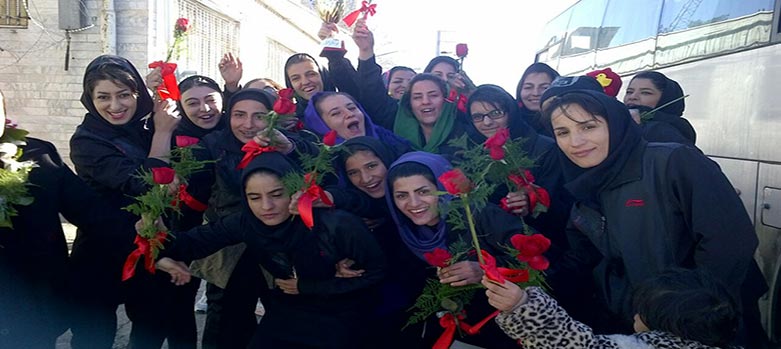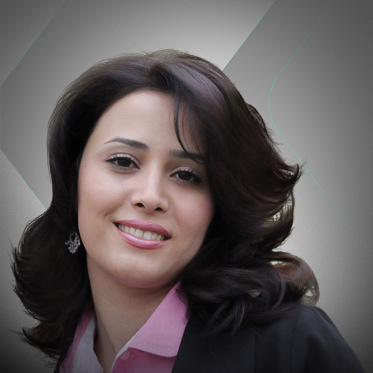Kurdish women football players fight for equality in Iran

LOS ANGELES, United States (K24)—When the Kurdistan Women’s football team became the Iranian champion in winter, they thought their financial and cultural problems were over—or at least significantly diminished. After all, they had proven how strong and successful they had become.
This team had won an honour for Kurdistan province in Northwest Iran that men’s football teams never achieved. Rather than being praised for their success, they received a cold shoulder from Kurdistan Province authorities.
“Only a few families, mostly women, showed up with flowers and pastries. None of the sports officials welcomed our team. I am sure if men’s football team had become the country’s champion, all the authorities and citizens would go to welcome them, and the news would be everywhere,” Mohtaram Heidari, a coach and organizer in Sanandaj [Sina], told K24 in a phone interview.
“In their interviews and speeches, the authorities claim that they support men and women sports equally but, in fact, the short-sightedness and patriarchal mentality prevents them from walking their talks. We have to struggle and fight and put all sorts of pressure on the authorities to receive the smallest support,” Heidari added.
This passionate coach says that men run and control almost all the sport affairs in the province and that includes women sports too. She says men strongly discriminate against female athletes.
“I can identify four main reasons why women sports is marginalized: Ideological views that says women have been created only for domestic duties. Patriarchy that is threatened by athletic and strong women. Traditions that chain women. Corruption that does not allow the allocated budgets to reach women athletes,” Heidari said.
She says and her few devoted female colleagues aren’t only fighting for sports and their battle has a larger context.
“We want Kurdish women to be psychically and mentally healthy and sport is one of the most effective tools. Sport also strengthens women’s personalities and builds confidence in them. In addition we want to take these women out of the impoverished region so they meet athletes from across the country and become familiar with the diversity of culture within Iran. It will open their horizons.”
The players, organizers, and coaches say that not only have they not received any payment for their efforts, but also they have been “attacked and humiliated.”
These women have been accused of being “hermaphrodites” and having “hormone issues.”
The women deny the accusations and say they play according to FIFA standards and they go through all sorts of tests and maintain medical files.
“But the society we live in is intimidated by women’s success, especially in fields that are traditionally assigned as 'men’s territories,'” Heidari explained.
When the Kurdish team went to compete in the national match, the players were weary and tired. Boushehr, the city that hosted the game is in Southern Iran, 1,035 kilometers from Sanandaj.
Because of lack of budget Kurdistan teams can never fly and have to take a bus to attend the matches.
“Most other teams have nice and new athletic outfits, a psychologist, a masseuse, and a dietician with them. Many of the players in the rest of Iran receive payments from their municipalities. The Kurdistan [province] team has a group of volunteer players between the ages of 16 and 23 who weren’t even properly fed or clothed,” Sharmin Rahmati, one of the prominent coaches, told K24.
Despite lack of resources, the Kurdistan team became the country’s champion.
The Kurdistan province had been in the Premier League of Iran since 2004. But they lacked good sponsors and players. For that reason in 2010, the Kurdistan team was canceled.
Rahmati and Heidari started a futsal, or indoor football, team in 2010 and relied on friends and relatives’ contributions to raise a meager fund for their team.
But in 2014, these two coaches, who are deeply enthusiastic about women’s football in Kurdistan, were able to gather some good football players from across the province. Young and eager football players volunteered to practice with the fledgling team.
“We had six players who were only 13-year-olds. The rest were older. Practicing for the competitions was only one of the many challenges. We had to go to meetings after meetings to raise funds for the players, hoping to reimburse them for their commute and accommodations expenses,” Rahmati said.
“A lot of time after practicing for hours I had to run home and cook for the team because we had no other way to feed the kids!” Rahmati said.
These days, however, the Kurdistan Women’s Football Team is feeling hopeful.
“Thankfully, we were able to recruit the prominent player Bayan Mahmoodi in 2015 and she has brought us new players too,” Rahmati said.
Bayan Mahmoodi, from Jawanro, Kermanshah Province, has been invited by teams in England and Italy and used to play for Isfahan before she gave up on the financially rewarding opportunities and joined Kurdistan team.
“I feel I owe Kurdistan. This was my way of paying back my dues,” Bayan Mahmoodi told K24 in a phone interview.
Fatemeh Sadeghi is another loyal and strong team member. Because of her skills on the field, she was offered a decent payment to play for the Uremia team but she settled for less than half the pay to stay with the Kurdistan team. The team is also happy that the new chair of the municipality in Kurdistan has been offering some financial support.
For these women playing football isn’t only a sport. They are fighting for equality and demonstrating women’s power and abilities outside of the domestic life.
